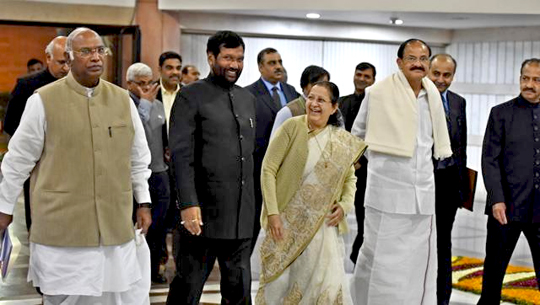New Delhi, Apr 24: Lok Sabha speaker Sumitra Mahajan has called an all party meeting on Sunday ahead of the next session of the Parliament that begins on Monday. The meet has been called to ensure smooth functioning of the house.
The upcoming session is all set to be a stormy affair with many Opposition parties closing ranks over the imposition of Presidents’ Rule in Uttarakhand.
Even as the government has listed a heavy agenda for the session, including passage of 13 bills in Lok Sabha and 11 bills in Rajya Sabha, there is an understanding among its floor managers that pushing the contentious measures like GST won’t be possible in first few days.
The session begins in the middle of a raging political controversy over the Uttarkhand political crisis in which Centre’s role has come in for scathing criticism besides drought-like conditions in 10 states.
A number of Opposition parties have given notices for suspension of Question Hour on the first day of the session over the Uttarakhand issue and sought a discussion on the drought in the first week.
Congress’s deputy leader in the Rajya Sabha Anand Sharma has sought a resolution by the Upper House that seeks to “deplore” the “destabilisation” of the democratically-elected government in Uttarakhand and “disapprove the unjustified” imposition of President’s Rule in the state.
Congress president Sonia Gandhi, who had met select party leaders for a strategy meeting to discuss the Uttarakhand had suggested that the party should take an aggressive stand on this issue.
Apart from the Uttarakhand issue, Congress will also target the government over imposition of President’s rule in Arunachal Pradesh, the Pathankot terror attack, the Ishrat Jahan case, drought management, and alleged communalisation of education institutes.
After the near wash-out of the two sessions last year, the government is looking ahead to the second half of the Budget session to push bills, including the all-important Goods and Services Tax Bill, touted as the biggest tax reform in India.
The financial business, including discussion on demands for grants of various ministries in Lok Sabha and working of some ministries in Rajya Sabha, consideration and passing of the Railways Appropriation Bill, 2016 and Finance Bill, 2016 constitutes the main agenda of this session of the Parliament.
The bills to be taken up in Parliament include the Right to Fair Compensation and Transparency in Land Acquisition, Rehabilitation and Resettlement (Amendment) Second Bill, 2015.
The report of Joint Committee of Parliament is awaited on this matter.
During the 15 sittings of the session, besides ratification of Presidential Proclamation in Uttarkhand under Article 356 of the Constitution, two Ordinances--- the Uttarakhand Appropriation (Vote on Account) Ordinance, 2016 and The Enemy Property (Amendment and Validation) Second Ordinance, 2016 are also on the agenda.
In this session, the government has listed 13 bills for Lok Sabha begining with the Sikh Gurudwaras (Amendment) Bill, 2016, which is listed on the first working day.
Other bills include the Lok Pal and Lok Ayuktas and other related laws (Amendment) Bill, 2014; the Compensatory Afforestation Fund Bill, 2015; the Benami Transactions (Prohibition) Amendment Bill, the Consumer Protection Bill (2015), the Enemy Property (Amendment and Validation) Bill, 2016 and the Whistle Blowers Protection (Amendment) Bill,2015.
Lok Sabha will also take up discussion on Demands for Grants of the Ministry of Railways and the related Appropriation Bill for 2016-17 on April 26.
This will be followed by discussion on Demands for Grants of the Ministries of Development of North-Eastern Region, Housing and Urban Poverty Alleviation, Skill Development and Entrepreneurship, Social Justice and Empowerment and Civil Aviation.
Rajya Sabha will discuss working of the Ministries of Health and Family Welfare, Human Resource Development, Finance, Micro, Small and Medium Enterprises and External Affairs. Thereafter, Finance Bill, 2016 and application of Guillotine will be taken up.
The Upper House is also expected to take bills including the Constitution (Scheduled Castes) Order (Amendment) Bill, 2016, the Mines and Minerals (Development and Regulation) Amendment Bill, 2016 and the Whistle Blowers Protection (Amendment) Bill, 2015 among others.






Comments
Add new comment